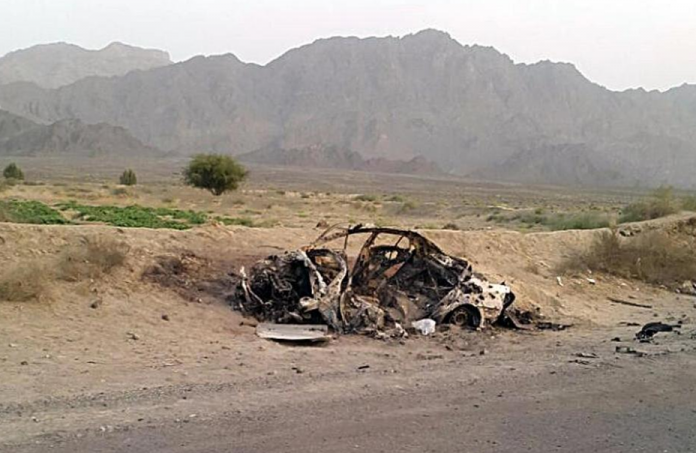
ISLAMABAD, Pakistan – The U.S. drone strike that killed Taliban chief Akhtar Mohammad Mansour represents another escalation in U.S. involvement in the war in Afghanistan by trying to cripple an insurgent group that has for years found refuge on Pakistani soil.
The strike early Saturday marks the most aggressive U.S. military action in Pakistan since the 2011 raid that killed Osama bin Laden. It is also thought to be the first time that the U.S. military has directly targeted the top leader of the Afghan Taliban, a potentially destabilizing action that could leave the group violently lashing out as it seeks to find anew leader.
President Barack Obama called Mansour’s death “an important milestone. ”
“We have a high-profile leader who has been consistently part of operations and plans to potentially harm U.S. personnel and has been resistant to the kinds of peace talks and reconciliation that could ultimately bring an end to decades of war in Afghanistan,” he said during a visit to Vietnam.
While Obama denied that the attack represented a shift in the U.S. approach, analysts see it as an escalation.
“This is an unprecedented move to decapitate the Taliban leadership in its safe haven of Pakistan,” said Bruce Riedel, a South Asia expert at the Brookings Institution. “It exposes Pakistan’s role in promoting and protecting the Taliban, and will provoke a crisis in U.S.-Pakistan relations.”
But unlike the bin Laden raid, which prompted outrage in Pakistan, the reported strike on Mansour provoked a fairly muted reaction Sunday from Pakistani government and military leaders, even as Afghan officials cheered and described the attack as proof of the Afghan Taliban’s deep presence in Pakistan.
“While further investigations are being carried out, Pakistan wishes to once again state that the drone attack was a violation of its sovereignty,” the country’s Foreign Ministry said in a statement, adding that it was unable to confirm whether Mansour had been killed.
What the apparent blow means for the Taliban remains uncertain. When Mansour took over after the death of longtime leader Mohammad Omar was announced last year, he had already effectively been running the group for two years, said Wahid Mozhda, a former Taliban diplomat who is now a political analyst in Kabul.
Appointing a successor now may be more challenging, with Omar’s eldest son, Mohammad Yaqob, and top deputies Sirajuddin Haqqani and Moulavi Haibatullah Akhunzada likely to be vying for control.
“It is very hard to anticipate who would be Akhtar Mansour’s successor among these three men,” Mozhda said.
If Mansour’s death is confirmed (some Taliban supporters deny he was killed), the strike will cause even more turmoil for an insurgency movement that was already showing signs of fraying, despite continued success on the battlefield.
Although Mansour, working through proxies, succeeded in quelling several insurrections against his leadership, he was also apparently a man on the run.
Mansour was not in direct contact with senior Taliban leaders, who received directives from him via emails issued by close aides or through audio tapes, said Rahimullah Yusufzai, a journalist and longtime Taliban observer from Peshawar. “He had adopted the policy of living life as a phantom.”
Pakistan’s Foreign Ministry has not confirmed Mansour’s death. A statement said officials had recovered the body of a man named Wali Muhammad, believed to be Mansour’s alias. That man had been in Iran and only entered Pakistan on Saturday, the day of the drone strike.
“His passport was bearing a valid Iranian visa,” the statement said.
The body is believed to still be in a hospital in Quetta.
Despite Mansour’s possible absence, the Taliban has been carrying out daily operations throughout Afghanistan, some of which involved amassing dozens of militants for days-long battles against Afghan security forces.
For Taliban leaders, a key question is whether Saturday’s drone strike will be followed up by additional U.S. military actions in southwestern Pakistan.
Saad Muhammad, a retired Pakistani general who was Pakistan’s defense attache to Kabul from 2003 to 2006, said the Taliban will face “a very difficult choice.”
“If they remain in Quetta, in their comfort zone, they will have to deal with some Pakistani pressure to leave,” he said. “But if they go out, they will have to deal with attacks that could be life-threatening.”
U.S. officials said the drone strike was justified because Mansour refused to negotiate with Afghan leaders and had been plotting to attack U.S. forces in Afghanistan.

